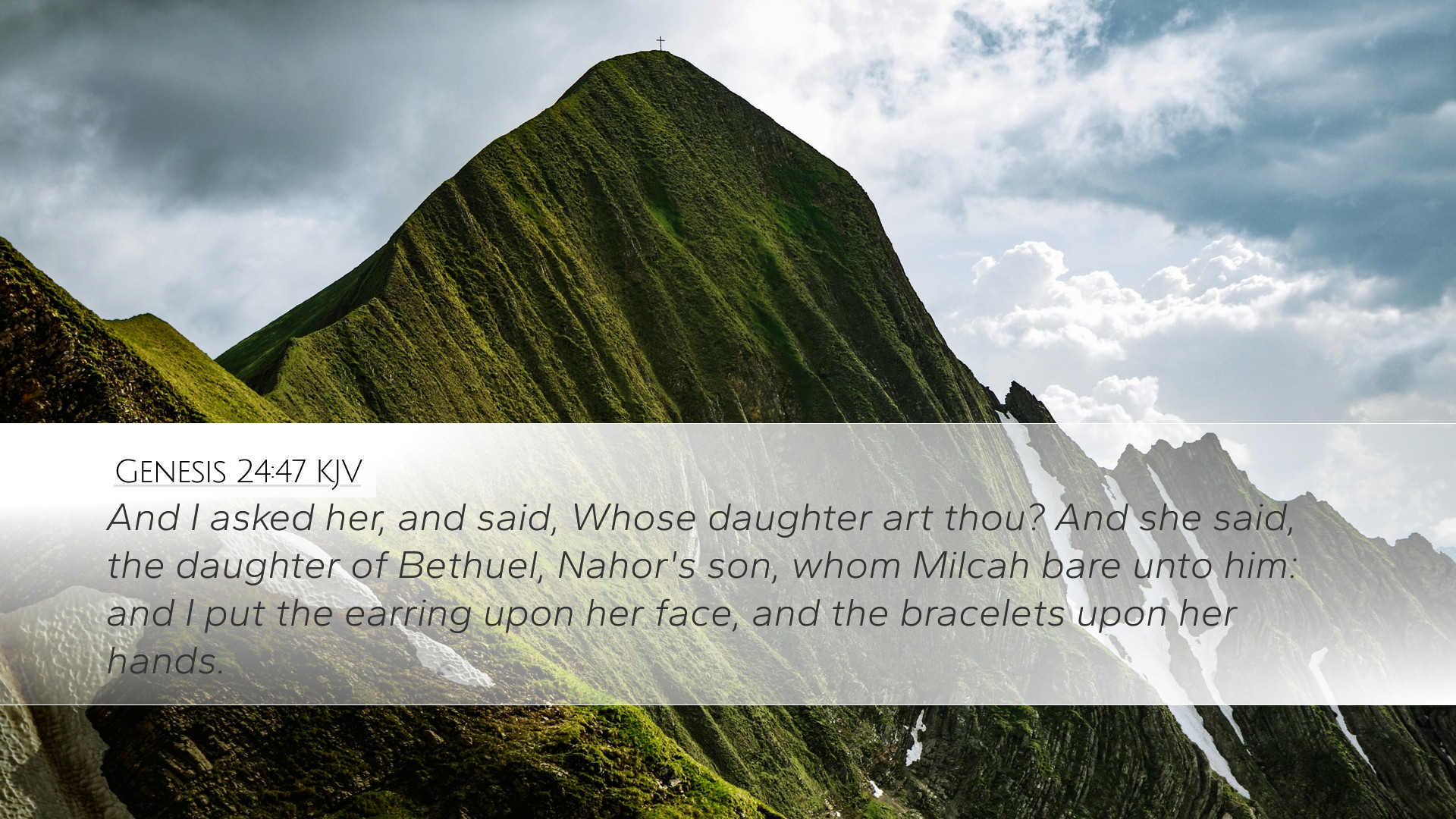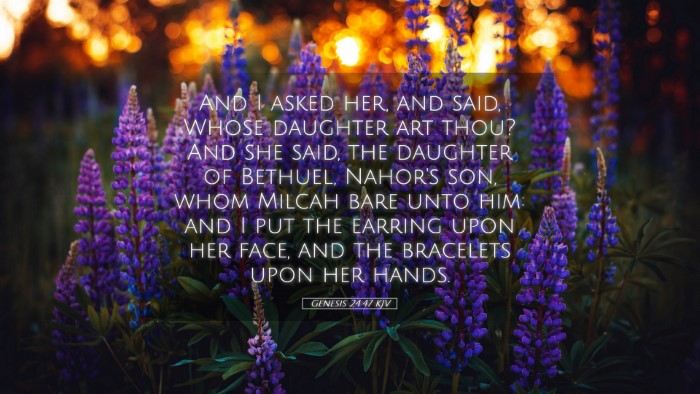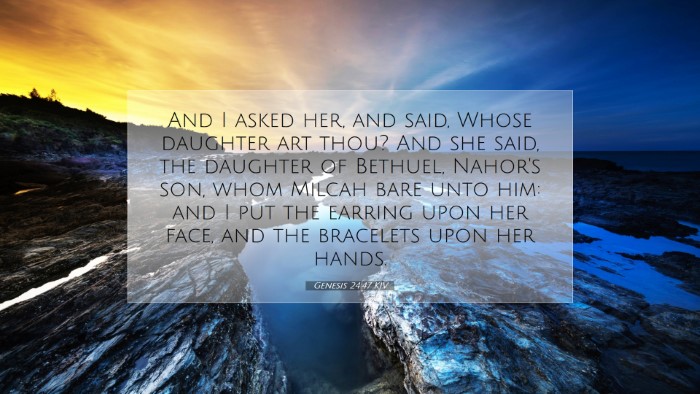Commentary on Genesis 24:47
Genesis 24:47 states, "And I asked her, and said, Whose daughter art thou? And she said, The daughter of Bethuel, Nahor's son, whom Milcah bare unto him: and I put the earring upon her face, and the bracelets upon her hands." This verse plays a significant role in the narrative of Abraham's servant, tasked with finding a bride for Isaac, reflecting the fulfillment of the covenant promise and God’s divine providence.
Contextual Overview
The background of this verse is important for understanding its implications. Abraham, having received a command from God to seek a wife for his son Isaac from among his own kin (Genesis 24:3), sends his servant with specific instructions. The journey undertaken is not merely a physical search but a spiritual mission as well, paralleling the quest for a suitable partner who shares in the covenantal faith.
Insights from Matthew Henry
Matthew Henry notes the meticulousness of the servant in his approach. The request for the bride's lineage signifies the importance of covenantal family ties. Henry emphasizes that the servant’s prayerful reliance on God led to directly meeting Rebekah, indicating that those who seek the Lord in earnest will find His direction. In his analysis, he draws attention to the significance of family and faith in marital unions, noting that the servant's inquiry into Rebekah's parentage was critical to the task at hand.
Servant’s Actions and Symbolism
The act of placing the earring and bracelets upon Rebekah serves as a symbol of wealth, betrothal, and covenant. Henry illuminates this act as not merely a token of a bride's adornment but as an indication of the favor of God in the choice of a spouse for Isaac. The ornaments carry their cultural significance, representing honor and commitment in the marital promise.
Albert Barnes Commentary
Albert Barnes elaborates on the cultural customs surrounding marriage in ancient times, underlining that the servant's inquiry regarding Rebekah's father was a sign of respect and importance placed on familial connections. Barnes posits that Rebekah’s acknowledgment of her lineage, "the daughter of Bethuel," affirms her patriarchal connections, validating her as a worthy bride for Isaac.
Divine Guidance
Additionally, Barnes emphasizes the role of divine providence in the servant's successful encounter with Rebekah. He reflects on the nature of God's guidance, indicating that it is not circumstantial but rather providentially orchestrated. The alignment of Rebekah's answer with the expectations set forth by Abraham showcases a divine hand at work. This instills a deeper sense of trust in God's providential care when it comes to fulfilling His promises.
Adam Clarke’s Perspective
Adam Clarke's discourse on this passage delves into the devotional aspects of the events. Clarke emphasizes the significance of the servant’s prayer before approaching Rebekah and how this exemplifies reliance on God’s providential deliveries. The act of inquiry about Rebekah’s parentage does not merely serve logistical purposes but reflects spiritual discernment in seeking a God-fearing spouse for Isaac.
The Miraculous Meeting
Clarke reflects on the miraculous nature of Rebekah’s appearance and attributes it to the hand of God working through prayer. This event is a cornerstone of demonstrating how God responds to the faithful seeking His will in relational aspects. Clarke prods readers to understand that God's involvement in the details of life—including marriage—is a testament to His ongoing covenantal relationship with His people.
Theological Themes
In synthesizing these commentaries, we recognize several essential themes:
- Covenant Faithfulness: The pursuit of Rebekah was rooted in the covenant established with Abraham, exemplifying that God’s promises extend to subsequent generations.
- The Importance of Lineage: The inquiry about Rebekah’s lineage underscores the biblical theme of family heritage, especially in terms of faithfulness to God’s promises.
- Divine Providence: The orchestrated events highlight God’s sovereign control over circumstances, assuring believers that their paths are guided by God.
- Prayer and Discernment: The servant's model of prayer is a vital reminder for believers that prayer is instrumental in seeking God's will, particularly in significant life decisions.
Practical Applications
For pastors, students, theologians, and Bible scholars, Genesis 24:47 is rich with applications:
- Spiritual Preparation: Just as the servant prepared himself spiritually through prayer, so must believers ready themselves for divine appointments in their lives.
- Emphasizing Godly Heritage: When considering marriage, the faith background is crucial; this narrative encourages discussions around dating and marriages within the faith community.
- Reliance on God: In every circumstance of life, understanding that God is orchestrating events encourages reliance on His plans rather than individual ambitions.
- Community Support: Engaging the church community in relationship decisions can provide wisdom and support, echoing the communal aspects present in Abraham's family.
Conclusion
Genesis 24:47 is not merely a narrative detail but a critical insight into God’s covenant faithfulness, providence, and the importance of seeking divine guidance in relational matters. Through the lenses of esteemed commentators such as Matthew Henry, Albert Barnes, and Adam Clarke, this verse unfolds the layers of significance behind betrothal practices, lineage, and divine orchestration. It invites readers to reflect on their faith journey while reminding them of the importance of prayer and God's sovereign hand in their lives.


